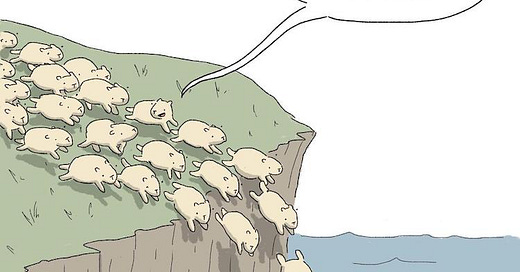Outtakes From The Unconscious: A Short Commentary; Why is it So Hard to Listen to So much Contemporary Music? Lemmings, Won't You Follow Me Down? Offending The Critics One More Time
Do you wanna know the problem with so much contemporary jazz that thinks it is trying to be adventurous or “experimental” ? It suffers from the same basic problem that a lot of so-called “new music” suffers from. Musicians come up with one basic decent idea and then drive it into the ground over anywhere from three to ten minutes (or longer; the legacy of Lamont Young). Well, it doesn’t work, and represents a complete misunderstanding of a certain kind of proto-minimalist “modernism.” A gimmick is not an idea, a mannerism is not style. Give us the idea, but that is not enough. Anyone can repeat one thing ad nauseum; it’s the context that makes it interesting, the way the idea is developed or, at the least, expanded upon. But this almost never happens; all I hear are insufferable drones, repetitive solos, non-variable figures. If I want that I can run to my laptop, do a little cut-and-paste and have something better in about an hour.
This has been to the great detriment of contemporary jazz, at one end of the spectrum. At the other end there is a strangely retro type of bebop-ism sprinkled with post-Coltrane fairy dust in the hopes of breaking through some kind of creative barrier. I listen to a lot of music, I compose and perform and record a lot of music, so I try to practice what I preach. The biggest overall problem is a lack of compositional imagination, as it makes each of the problems I have cited worse with sagging and listless performances that sound like psychological outtakes.
And to further aggravate the way in which contemporary jazz is presented, recording-wise, is the homogenization of recording techniques, which, with isolation (everyone in their separate and soundproofed recording space) gives the sound a soft-focus veneer so that even good - no, great - players seem leveled out in the mix from a lack of sonic depth and the imposition of digital volume leveling and, of course, dynamic stasis. This, I should add, is a problem not just with jazz but with nearly everything recorded today. Digital technique has taken certain things backward sonically; instead of taking advantage of its incredible promises of a sound that allows clarity and incredible dynamic range, we have used it to make everything sound, dynamically, almost exactly the same.
And the critics seem to eat it up. The problem may be that this is what they are used to. What I am calling for is NOT a return to analog but a throwback to analog advantage, using digital technology. It can be done. I know because I have done it. But maybe the critics are afraid they will be out of a job if they admit to these problems.
Sure, there’s exceptions. Maybe. It’s just so damned pervasive. And it is why good, and sometimes great, musicians often make bad music.
Hey, listen to a lot of 1960s rock and roll recorded to two track, the early punk bands who were able to portray the raw power of their work on Lps recorded in one room with maybe too much noise and distortion. If they could do it…..then jazzers can. Why the hell not?
We need the recorded sound (in creative music) to be dangerous, dissonant, dynamically shifting; we need to restore the human element of uncertainty and even error in the service of improvisation. It’s so damned simple yet few musicians are willing to take the risk.
I am willing to try if you lemmings will follow.






One of my treasured musical memories is of Steve Reich’s slowly developing, pulse-oriented Music for 18 Musicians, performed live outside in a suburban park on a summer night.
I’ve found that certain genres, styles, etc. are represented by a lot of junk, but it always seems possible that someone, somewhere has found a way to transcend the limitations of a given style. When I come across a masterly manifestation it’s a revelation.
At the risk of declaring myself culturally unregenerate, I'd rather get an unanesthetized root canal than listen to La-Mont(e) for any number of minutes no matter how his name is spelled.